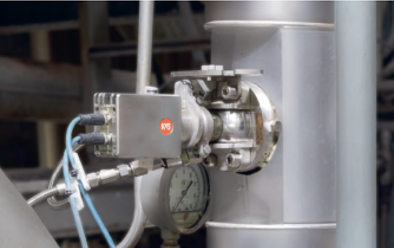Applications in Kraft pulping process

Optimizing the Kraft pulping process requires precise monitoring of critical process streams, and the KxS Retractable refractometer DCM-20 PASVE® plays a key role in ensuring efficiency and stability.
In brown stock washing, where the separation of cooking chemicals from pulp fibers is crucial for chemical recovery, the DCM-20 PASVE® provides real-time data to help mills optimize washing efficiency and reduce chemical losses.
Moving further into the recovery process, the refractometer ensures accurate black liquor concentration measurements before evaporation, preventing excessive viscosity and enabling efficient energy use. Similarly, in the recovery boiler feed, precise monitoring of black liquor solids helps mills balance combustion efficiency with equipment longevity.
Beyond these key process stages, the DCM-20 PASVE® contributes to improved green liquor clarification by providing real-time dissolved solids measurements before recausticizing. This ensures a well-balanced chemical cycle and minimizes scaling issues in the white liquor preparation process.
Throughout the mill, the ability to make real-time process adjustments based on reliable in-line refractometer data leads to reduced chemical and energy consumption, enhanced product quality, and improved environmental performance.
Instrumentation and installation considerations
Inline measurement sensors used in black liquor Dry Solids and green liquor Total Titratable Alkali (TTA) applications face extreme process conditions that can challenge measurement stability and reliability. These challenges vary depending on application and include high temperatures, pirssonite scaling, lime mud and calcium deposits, high pressures, process fluctuations, and chemical aggressiveness.
Refractometers used in these demanding environments must be purpose-built to withstand turbid, high-solids process fluids, which can scatter light and interfere with accurate measurement if not properly engineered with the right optics and advanced optical image detection software.
In black liquor applications, organic carryover and dissolved lignin can create a sticky residue on the sensor prism, impacting measurement reliability. In green liquor applications, heavy scaling can result in excessive build-up on the prism, which compromises accuracy. Purpose-built self-cleaning systems are critical to ensuring stable and reliable readings and trouble-free operation over time.
Measuring suspensions and filtrates during Brown Stock Washing (BSW) presents own kind of challenges. Standard retractable refractometers are not suitable for these applications. While automatic prism washing is rarely required, filtrates often contain fine sand, dirt, and residual wood fibers, which can be abrasive and damage the prism if the sensor is not properly shielded with mechanical protection to withstand these harsh conditions.
Why choose KxS for pulp mill applications?
KxS has over 40 years of expertise in pulp and paper industry applications. This deep knowledge ensures that the DCM-20 PASVE® retractable refractometer is purpose-built to perform reliably in these challenging environments. Every aspect of its design considers the specific process conditions, fouling tendencies, and operational safety requirements.
KxS does not focus solely on product specifications, but delivers both superior technology and in-depth process expertise, making KxS the leading choice for reliable refractive index measurement in Kraft chemical pulp mill applications.
